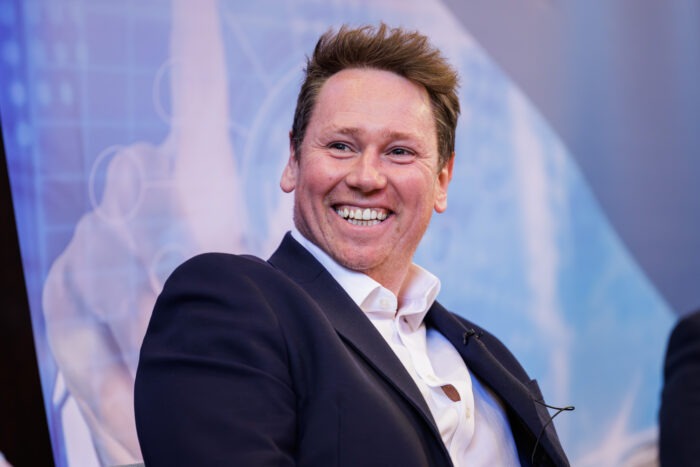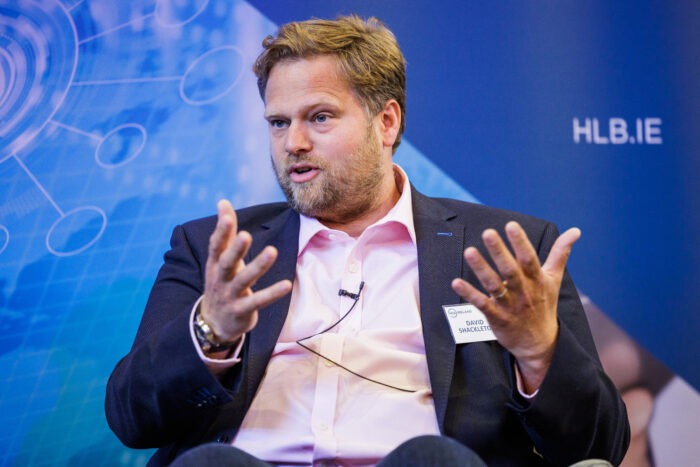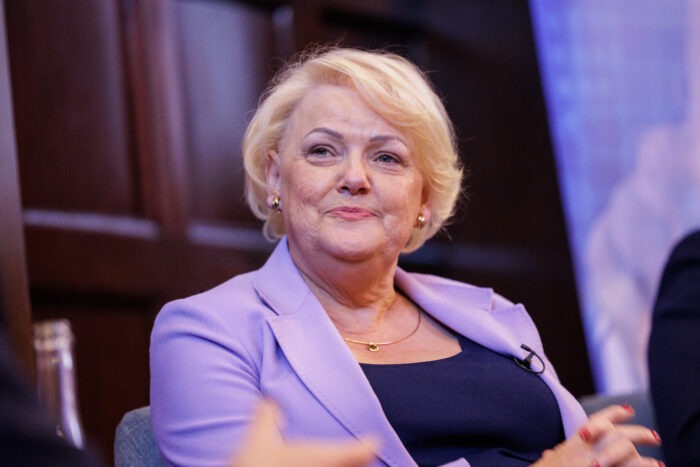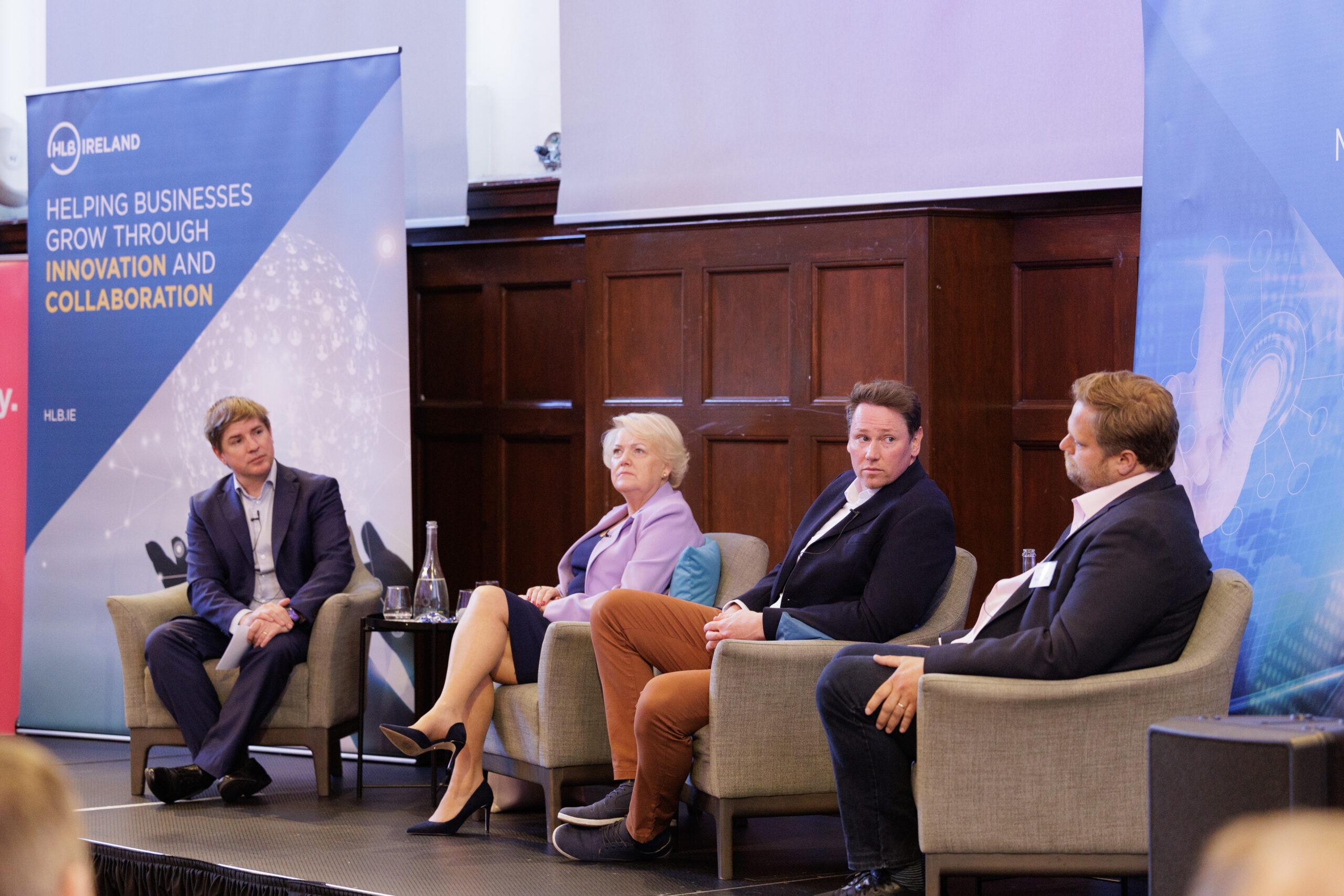Under the stained-glass windows of the Thomas Prior Hall in Ballsbridge, Mark Butler, managing partner of HLB Ireland and The Currency’s Tom Lyons hosted a panel of Irish entrepreneurs and senior leaders. Colum Lyons, CEO of ID-Pal, is in the process of scaling up his first startup. David Shackleton has scaled one business and exited another. And Geraldine Ruane has managed some of the most treasured institutions in the county.
Ruane’s story straddled the private and public sectors: “In the private sector, I worked in the pharma sector with big multinationals, which was a fabulous experience, particularly in terms of career development. This led me to the public sector, where I was able to apply the expertise and experience I gained in the private sector. What fascinated me about the public sector was the context in which it operated which meant that decision making was about lining up all of your stakeholders and the approach needed to consider the broader national implications.
“I’ve been involved with three historical organisations. As CEO of Ordnance Survey Ireland, the National Mapping Agency established in 1824 I was brought in to lead the commercialisation of the organisation which had been previously a civil service role.”
“Next, I moved on to Trinity College as the Chief Operations Officer, which was a fabulous challenge. It’s a 425-year-old university and ranks in the top 100 in the world. I had to professionalise and commercialise its activities, and introduce a masterplan for the regeneration of the campus, which was fascinating.
“That experience led me to the RDS. The RDS means different things to different people, but what interested me is that it is a nearly 300-year-old philanthropic organisation, and it has an exciting future.”
Colum Lyons’ business, ID-Pal, is focused on streamlining anti-money laundering processes: “I was previously a stockbroker and a trader. Many of my closest friends would laugh at me — I went from the fast, sexy world of finance to anti-money laundering.
“The business I founded is now seven years old, with close to 50 staff members and offices in Ireland, the UK, and recently, we launched an office in the US.
“The business was born out of my personal frustration with being unable to verify my own identity when setting up accounts. As a stockbroker, the goal was to get money in quickly, trade, and make commissions. But there were constant delays in getting people to verify their identities and send in their documents efficiently.
“The concept behind the business was a mobile app that made it easy and efficient for users to verify their identities from the comfort of their homes while streamlining operations for businesses.”

David Shackleton’s story starts with a Dublin startup focused on remittances, and ends with Elon Musk: “I completed my undergraduate degree in computer engineering, but I wasn’t very proficient at writing code. So, I went to the United States to work in strategy consulting, which I enjoyed, but I eventually grew tired of PowerPoint presentations. I returned to Ireland and co-founded a business called Ezetop, which we later rebranded as Ding.com.
“We then started a business called OpenBack, which focused on push notifications. Every app on your phone wants to send you push notifications to grab your attention and get you to click, read, or take action. We believed there was a better way to do this.
“We concentrated on a few large customers, one of which was Twitter. Our code helped Twitter gain an extra half a million users every day. If you have Twitter on your phone, our code is likely on it. Instead of agreeing to a long-term licensing deal, Twitter wanted to acquire our technology. We initially declined their offer, even though we were open to selling.
“This led to a series of robust negotiations where I pretended like I didn’t care (but didn’t sleep). We knew that Twitter’s market cap was very low at that time, and someone was going to make a move on the business. So we needed to act quickly.
“In just five weeks, we went from an agreed term sheet to closing the deal, thanks to the diligent work of our partners. We closed the deal on a Thursday, celebrated that night, and flew to San Francisco on Monday morning to meet our new bosses at Twitter’s headquarters on Market Street. Interestingly, at 6 a.m. that same morning, Elon Musk and the Twitter board decided to sell the company to Musk.”
Innovation

A theme of the night was innovation. The three leaders each had led very different types of organisations but they each had their own way of fostering and protecting innovation in their businesses.
“When I enter a business and see the word ‘innovation’ displayed prominently on the walls, it can be frustrating,” said Colum Lyons. “Innovation isn’t about quotes and inspirational messages. It’s about taking action. In many large businesses, there’s a disconnect between the ideals on the wall and the actual operations.
“In our business, we have a flat culture and allow anyone to voice their ideas at any time. Innovation, for me, isn’t just about massive, groundbreaking ideas. It’s about lots of small, incremental ideas generated by the entire team. We prioritize hiring people who want to be heard and want to have a voice.”
Shackleton talked about the challenge of preserving an innovative culture as a company grows: “Authentic leadership is essential, as leaders need to be genuine in their style, fostering trust, integrity, and a willingness to follow. Creating a culture that allows for mistakes is important for discovering breakthrough ideas that can drive sales up by ten per cent in a month.”
“As a company scales and its profitability, accountability, and investor expectations grow, the consequences of failure become more significant. It gets hard to maintain an innovative culture. However, discussing failures, promoting the idea that the best idea wins, and being open to change are all crucial.
“In the startup world, the situation is different and perhaps easier. When we were a small team of eight or nine people in our early days, everyone was invested in the shared vision. The commitment made it easier to foster an innovative environment.
Ireland
Irish culture and entrepreneurialism sometimes aren’t the best fit. The panelists talked about the good and the bad of building a business in Ireland.
“People talk about Irish begrudgery — but I found individually, people were really willing to help us out,” said Colum Lyons. “One of the things I discovered when setting up the business was that people were genuinely willing to give their time, offer advice, and help guide us through the process. These people weren’t looking to get their backs scratched. They genuinely believed in us and our vision. They would make introductions, suggest ideas, and recommend events or opportunities for us to explore, which was incredibly valuable in the early stages of our business.”
David Shackleton talked about Irish skepticism: “In my experience, I’ve encountered some challenges as a startup, particularly in winning over our first customers. When we approached customers in the United States, they were generally willing to give us a shot. When we pitched to Irish companies, there was an ‘ah sure, if I pay you, you’ll make it in six months’ time’. There’s a little of that Irish skepticism, which is maybe part of our nature as a people.”
Balance

The panelists’ passion for their businesses shone through on the stage. So it was unsurprising to hear them admitting they struggled with work-life balance.
“It’s absolutely horrendous,” said Shackleton. “The lack of work-life balance is awful and detrimental to one’s mental and physical health. It’s challenging, especially when you’re jumping on planes to meet customers in the States or the Middle East. And you do it because you want to. You push through because you want the business to succeed.
“When we sold back to Twitter, I intentionally tried to keep my schedule lighter, and it took about six months to start feeling more normal, like walking my kids to school.”
Colum Lyons said “I’ll be the first to admit that I don’t have a work-life balance. I find myself working long hours, starting early in the morning and ending late at night. About a year and a half ago, I finally managed to reclaim my weekends. However, there was a time when growing the business required working seven days a week, 24 hours a day, and never switching off.”
“Some people have advised me to relax, calm down, and take time for myself, like going on holidays. And while it’s easy to give advice, it’s hard to actually do it,” he added.
Talent

Each of the panelists had led big organisations, and they each came back to the theme of attracting and nurturing talent. Each had their strategies.
Ruane said: “[Employees] are savvy with due diligence undertaken before the interview process, so for me, the focus is on engaging them and ensuring they know the organisation has a great story – a story in which they can play an integral part. Personally, I’m highly invested in employee development and believe it’s important to provide a clear career path. It is important to me that the RDS team RDS are empowered and take ownership and responsibility to deliver the best for the RDS.”
Colum Lyons stressed the importance of giving employees ownership: “We put ten per cent of our business away for all the staff and we don’t let the executive leadership get access to it. So again, it’s for the staff rather than lining their own pockets.”
“One of the really proud facts of our businesses is that we’ve only ever lost two members of staff in seven years, which is down to the culture of the business,” he added.
“It’s super tough,” said Shackleton, ” in the early stages of a startup, finding and retaining the right people is crucial and challenging. Often, you find [people] through referrals or connections made along the way. And you’ve got to get them bought into your journey.”
“It gets tougher in the shift to teams up to a couple of hundred people. That was very tough, because all of your good engineers, especially, are getting calls every day. In some ways, they weren’t getting calls from recruiters or big businesses, you’d wonder whether you don’t have the best talent. And so it’s a double-edged sword,” he added.
This event was run in partnership with HLB Ireland. HLB Ireland is an advisory & accounting firm, and part of the HLB Global network of independent global advisory and accounting firms.


